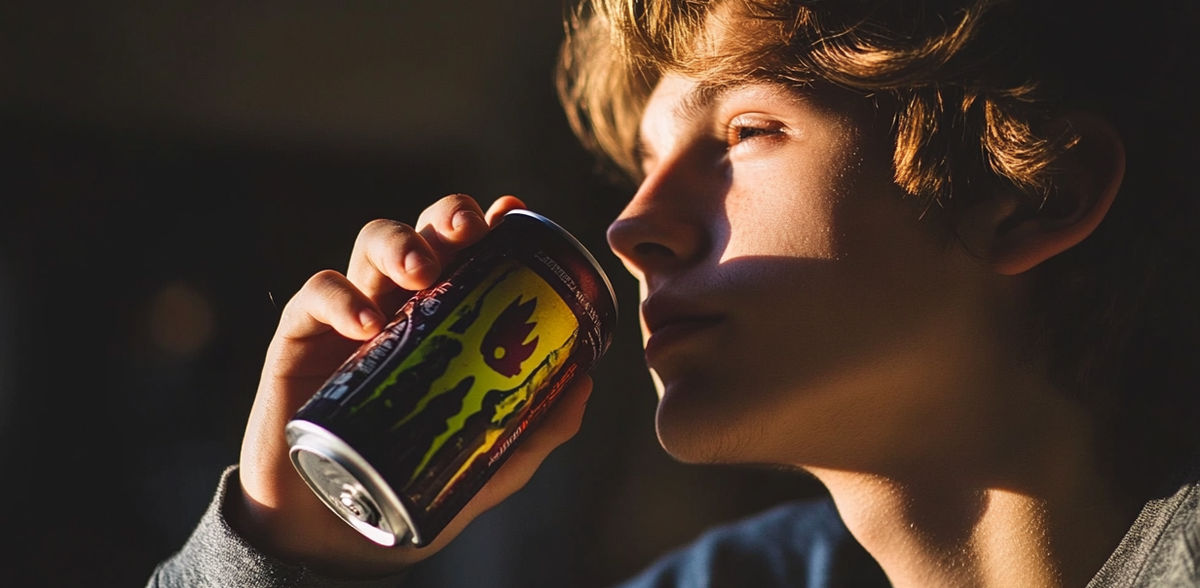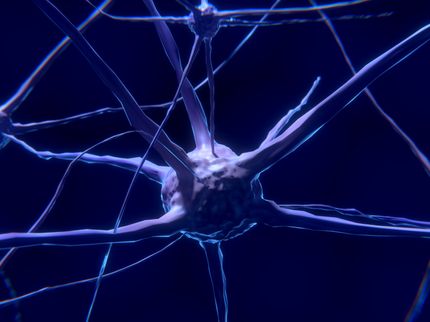Energy drinks: how dangerous are they for young people or those with a damaged heart?
Advertisement
Two thirds of young people in the EU consume energy drinks. The sweet taste and targeted marketing make the drinks particularly popular in this age group. Many doctors and nutrition experts are concerned about this development. In addition to the high sugar content, the caffeine they contain is considered to be a particular cause for concern. Current studies, for example on the effects on the cardiovascular system of young consumers, support the concerns.
Dr. Felix S. Oberhoffer from the Department of Paediatric cardiology and Intensive Care Medicine at the LMU Hospital in Munich has been studying the subject for years, has conducted a study on the subject together with colleagues supported by the German heart Foundation and has been involved in international research projects.

Dr. med. Felix S. Oberhoffer, assistant physician in the Department of Pediatric Cardiology and Pediatric Intensive Care Medicine,
LMU Klinikum München

Prof. Dr. med. KR Julian Chun, Member of the Scientific Advisory Board of the German Heart Foundation, Cardioangiologisches Centrum Bethanien (CCB), Chief Physician Cardiology, Agaplesion Markuskrankenhaus, Frankfurt am Main
CCB


Blood pressure rises measurably after just one energy drink
His EDUCATE study ("Energy-Drinks: Unexplored Cardiovascular Alterations in TEens and TwEens") (1) found that in healthy adolescents, even after consuming a weight-adjusted amount of an energy drink (= just under 100 ml of energy drink per 10 kg of body weight), blood pressure rises temporarily and the heart rhythm can change. Based on the study results, Dr. Oberhoffer's personal advice is: "Children and adolescents should be advised against consuming energy drinks, especially if they are at increased cardiovascular risk, for example if they have healed myocarditis, a corrected congenital heart defect, high blood pressure, diabetes or obesity, or are taking ADHD medication, for example." Further information at https://herzstiftung.de/risiko-energy-drinks
Heart specialist: "The dose makes the poison!"
Young consumers should also be better informed about the health risks and responsible use of drinks. Dr. Oberhoffer gives the following examples: "Only moderate consumption, not at the same time as alcohol and not before or during exercise."
Prof. Dr. KR Julian Chun, member of the Scientific Advisory Board of the German Heart Foundation and cardiologist at Cardioangiologisches Centrum Bethanien (CCB), Frankfurt am Main, also advocates more education for young people. Stress and excessive physical activity could increase the negative health effects of drinks, he warns. As is often the case in life: "The dose makes the poison!"
Two doses of an energy drink are often already over the limit for teenagers
But at what dose is there a risk? A 250 ml can of an energy drink contains around 80 mg of caffeine on average. This is about three times as much as is contained in the same amount of most normal cola drinks. However, according to the European Food Safety Authority (EFSA), children and adolescents should not consume more than 3 mg of caffeine per kilogram of body weight per day. In practice, this means that even half a liter of an energy drink puts a teenager weighing 50 kg over this limit. Many children and adolescents consume significantly more of the sweet drinks in their everyday lives.
In addition to palpitations, insomnia and gastrointestinal complaints, the EDUCATE study also found that this can lead to an increase in blood pressure and changes in heart rhythm. "Other ingredients in energy drinks such as guarana or taurine may even exacerbate the adverse effects," warns cardiologist and head of cardiology Prof. Chun. New study data support this conclusion.
Consumption with pre-damaged hearts: tragic death prompted the studies
This can be particularly dangerous if you have a pre-damaged heart. This is the conclusion drawn by the clinician Dr. Oberhoffer from a tragic case a few years ago. A 16-year-old schoolgirl collapsed in class due to a cardiac arrhythmia. She no longer had a pulse, could initially be resuscitated, but died a few days later in hospital (1).
It turned out that she had suffered an unnoticed inflammation of the heart muscle (myocarditis). Her heart was damaged as a result. In the three days before the collapse, the student had studied for an exam and prepared a presentation, slept very little and consumed large quantities of energy drinks.
The girl had been treated at Dr. Oberhoffer's department at the LMU Clinic in Munich. Since then, he has been asking himself: How did the excessive consumption of energy drinks contribute to the tragic outcome? Dr. Oberhoffer says that the inflammation of the heart muscle was probably the decisive factor: "Myocarditis alone is associated with an increased risk of serious arrhythmia." But he is also convinced: "This risk is potentially further increased by the simultaneous consumption of larger quantities of energy drinks!"
Particularly dangerous: excessive consumption in combination with alcohol, sport, stress
The tragic death prompted him to examine the effects of caffeinated sweet drinks on the cardiovascular system of young people in more in-depth studies such as EDUCATE. An international literature review (2), in which he was also involved, confirms that excessive consumption of energy drinks in conjunction with trigger factors (sport, alcohol, stress) and pre-existing conditions can endanger the heart, but also other organs such as the kidneys and brain of adolescents.
Ban on the sale of energy drinks to minors?
Based on the current data, various doctors and organizations are in favour of an age limit for the purchase of energy drinks. There is a ban on the sale of energy drinks to minors in Lithuania and Latvia, for example. Dr. Oberhoffer is also in favour of this in Germany. This is because, he argues, the EDUCATE study shows that even the dose of caffeine considered "harmless" in this age group has an unfavorable effect on the cardiovascular system.
At a public expert discussion of the Committee on Food and Agriculture (3), Oberhoffer received support from Prof. Dr. Nikolaus Haas, Clinic Director of the Department of Pediatric Cardiology and Pediatric Intensive Care Medicine at the LMU Munich. The consumer associations in Germany have also been calling for a ban on the sale of drinks containing more than 150 mg of caffeine per liter to minors for some time.
According to other experts, however, the findings to date do not (yet) justify such a step in Germany (4). Currently, 320 mg of caffeine per liter is permitted in a soft drink in Germany - the manufacturers of energy drinks generally make full use of this limit. However, from 150 mg of caffeine per liter, a warning label is mandatory stating that the drink is not suitable for children or pregnant or breastfeeding women.
The Federal Institute for Risk Assessment (BfR) also warns of health risks
The Federal Institute for Risk Assessment (BfR) has also already warned of cardiovascular health risks for children from excessive consumption of energy drinks (5). For "healthy adults", however, studies have shown that moderate consumption within the EFSA limits (200 mg caffeine as a single dose, up to 400 mg/day) poses "no health risk", according to the BfR.
(sb)
Service: Additional information on current studies and recommendations on energy drinks can be found in various articles on the Heart Foundation website: https://herzstiftung.de/risiko-energy-drinks
Literature:
(1) Oberhoffer F.S. et al. Energydrinks and their effects on cardiovascular function in children and adolescents. Monatsschrift Kinderheilkunde published online June 28, 2023. https://www.researchgate.net/publication/371938253_Energydrinks_und_ihre_Auswirk...
(2) Pengzhu L. et al. Energy Drinks and Adverse Health Events in Children and Adolescents: A Literature Review. Nutrients 2023. https://www.ncbi.nlm.nih.gov/pmc/articles/PMC10255861/#:~:text=This%20literature....
(3) Hearing German Bundestag. Public expert discussion of the Committee on Food and Agriculture on Tuesday, September 10, 2024. Doctors warn against energy drinks and call for age limit. https://bundestag.api.proxy.bund.dev/dokumente/textarchiv/2024/kw37-pa-ernaehrun...
(4) German Bundestag, parliamentary news from 11.09.24: "Mediziner warnen vor Energydrinks und fordern Altersgrenze": https://www.bundestag.de/presse/hib/kurzmeldungen-1017260
(5) BfR. Children and adolescents: Excessive consumption of energy drinks
increases health risk for heart and circulation. BfR Statement No. 018/2019 of May 27, 2019 https://www.bfr.bund.de/cm/343/kinder-und-jugendliche-uebermaessiger-konsum-von-...
More:
- https://www.nature.com/articles/s41390-023-02598-y
- https://www.ahajournals.org/doi/full/10.1161/JAHA.116.004448
- https://www.heartrhythmjournal.com/article/S1547-5271(24)00189-9/abstract
Note: This article has been translated using a computer system without human intervention. LUMITOS offers these automatic translations to present a wider range of current news. Since this article has been translated with automatic translation, it is possible that it contains errors in vocabulary, syntax or grammar. The original article in German can be found here.






























































